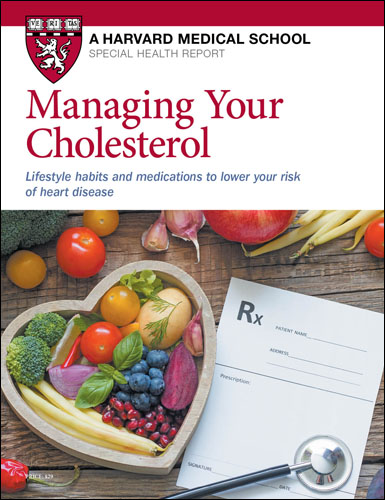The lowdown on "good" cholesterol
Long touted as beneficial for heart health, high-density lipoprotein (HDL) is more complicated than once thought.
- Reviewed by Deepak L. Bhatt, M.D., M.P.H, Former Editor in Chief, Harvard Heart Letter

Our bodies rely on cholesterol to create cell membranes, make hormones, and synthetize vitamin D, among other things. This waxy fat travels through the blood in tiny particles called lipoproteins, which come in a range of shapes and sizes. But too much of the wrong type in the wrong place can create problems.
The tale of "bad" low-density lipoprotein (LDL) is pretty straightforward. Excess LDL ends up in artery walls, triggering plaque buildup and inflammation, and raising heart attack risk. Lowering LDL reduces that risk. But the story of "good" high-density lipoprotein (HDL) is a bit more complex.
"We used think of HDL as protective because it grabs cholesterol from the bloodstream and other tissues and transports it to the liver, where it's recycled or disposed," says Dr. Jorge Plutzky, director of preventive cardiology at Harvard-affiliated Brigham and Women's Hospital. But it turns out that not all HDL particles perform this function, which is known as reverse cholesterol transport. Some types of HDL are indifferent to cholesterol, and others actually block the process of reverse cholesterol transport.
Failed promises
Over the past decade, five different experimental drugs known as CETP inhibitors have been tested in large clinical trials in people with low HDL. All the drugs raise HDL levels dramatically — sometimes by as much as 60%. But most haven't clearly achieved their real goal: preventing heart attacks, stroke, and other complications from clogged arteries.
Maybe that's because they increased the wrong type of HDL, according to researchers at the Harvard T.H. Chan School of Public Health, who scrutinized 16 of the 200-plus different subtypes of HDL. In a study published in 2021 in Arteriosclerosis, Thrombosis, and Vascular Biology, they found that two of the experimental drugs, evacetrapib and torcetrapib, tended to raise the subtypes of HDL that are not associated with cardiovascular benefit.
Still, another new CETP inhibitor called obicetrapib looks promising. When taken with a high-intensity statin, the drug raises HDL but also — perhaps more importantly — lowers LDL by about 50%. Larger studies of this experimental drug are currently under way.
Danger from very high HDL?
Past observational studies in large groups of people have suggested that those with higher HDL levels (above 40 mg/dL for men and 50 mg/dL for women) tend to have fewer heart attacks. However, a recent analysis found that people with very high HDL levels (80 mg/dL or higher) were about as likely to die from heart disease as people with low HDL (30 mg/dL or lower). The findings, gleaned from nearly 20,000 people with heart disease, were published May 18, 2022, in JAMA Cardiology.
Rare genetic variations known to cause high HDL but also increase heart disease risk didn't explain these paradoxical findings. Other health habits could be at play, such as frequent alcohol intake, which is known to raise HDL and may increase heart attack risk (see "A daily drink: Not as harmless as you think" in the July 2022 Heart Letter).
In addition, a national large health survey found that people who consumed at least 10% of total calories from added sugar were up to three times more likely to have low HDL as those who took in half that much sugar. People who consumed the most sugar had HDL levels that were, on average, about 11 points lower than the low-sugar-intake group. Other research has linked high-sugar diets with an increased risk of death from heart disease.
Take-home message
What should you make of these new results? A very low or very high HDL value should be a red flag warning to double down on your efforts to dodge heart disease, an editorial accompanying the JAMA Cardiology study suggests.
Traditionally, the things that doctors recommend to keep your heart healthy, such as exercising and eating a mostly plant-based diet, are also thought to boost HDL. "That's especially true for people who have high triglycerides, which tend to go hand-in-hand with low HDL levels," says Dr. Plutzky.
Also, lifestyle changes have clear benefits even if they don't change your HDL levels. For example, among people who smoke, quitting can raise HDL levels and is also known to markedly reduce cardiovascular risk.
"For lowering your risk of heart attack and stroke, reducing elevated LDL cholesterol is still the main priority," says Dr. Plutzky. If you've already had a heart attack or been diagnosed with heart disease, aim for an LDL of at least 70 mg/dL, if not lower. For everyone else, an LDL of 100 mg/dL or lower is a good goal.
Image: © designer491/Getty Images
About the Author

Julie Corliss, Executive Editor, Harvard Heart Letter
About the Reviewer

Deepak L. Bhatt, M.D., M.P.H, Former Editor in Chief, Harvard Heart Letter
Disclaimer:
As a service to our readers, Harvard Health Publishing provides access to our library of archived content. Please note the date of last review or update on all articles.
No content on this site, regardless of date, should ever be used as a substitute for direct medical advice from your doctor or other qualified clinician.
















